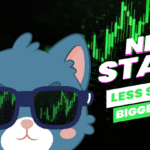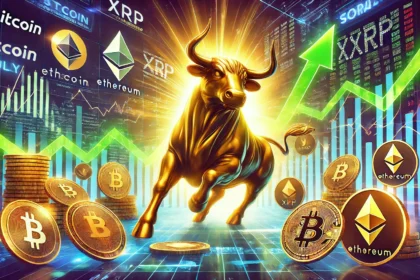Based on available reports, Kraken has officially completed its acquisition of the Ninjatrader deal valued at $1.5 billion, strengthening its bid to evolve into a full-spectrum financial platform. Alongside this, the San Francisco-based crypto exchange revealed a robust $472 million in gross revenue for the first quarter of 2025, a 19% increase compared to Q1 2024.
A $1.5 Billion Leap Toward Multi-Asset Finance
First revealed in March, the Kraken Ninjatrader deal was finalized this week, making it the largest known merger between a cryptocurrency exchange and a traditional finance platform to date. As part of this expansion, Kraken now offers access to more than 11,000 U.S. stocks and ETFs.
Ninjatrader, founded in 2003 and headquartered in Chicago, will continue to operate independently but with cross-access integration in place. This means existing Ninjatrader clients can now access Kraken’s crypto offerings, while Kraken’s users can explore futures and traditional markets via Ninjatrader’s infrastructure.

Revenue Growth Outpaces Volume Dip
Kraken’s financials for Q1 2025 showed strength despite a slight drop in crypto trading activity. The platform posted $472 million in gross revenue, up from approximately $396 million in the same period last year. Adjusted EBITDA reached $187 million, showing that operational efficiency remains intact even as spot market volumes fell by 7% compared to Q4 2024.
Kraken attributed part of this decline to broader market consolidation and post-halving recalibrations. Still, the firm says its expanding product suite, now inclusive of futures, stocks, and ETFs, is important to smoothing revenue volatility typically associated with crypto-only exchanges.
Regulatory Readiness and Positioning
As the U.S. Securities and Exchange Commission (SEC) and other regulatory bodies intensify their scrutiny of both crypto and hybrid platforms, Kraken’s expansion raises questions about compliance readiness. A source familiar with the matter confirmed that Kraken has been working with regulators to ensure its multi-asset services meet existing and anticipated standards.
Financial Times reported last month that the Commodity Futures Trading Commission (CFTC) had already engaged with Kraken in discussions surrounding its derivatives licensing plans in light of the Ninjatrader deal . Kraken, which recently resolved a dispute with the SEC over its staking services, is showing a more cooperative stance as it moves deeper into regulated markets.
Kraken’s Competitive Outlook in a Consolidating Market
The timing of the Ninjatrader deal also places Kraken in direct competition with platforms like Coinbase and Robinhood, both of which are also attempting to broaden their financial offerings beyond core crypto services. While Coinbase has recently focused on international expansion and institutional custody, Kraken’s current strategy appears more U.S.-centric, with a strong emphasis on retail accessibility.

According to Statista, the U.S. futures market saw more than 6 billion contracts traded in 2024. Kraken now has a gateway into that liquidity, backed by existing crypto capabilities and a rapidly evolving product roadmap.
What This Means for Users and the Market
The integration of crypto and TradFi under one roof has long been anticipated, but Kraken’s execution puts the concept into practice at a scale not yet seen. More importantly, it introduces a new norm where users don’t have to choose between asset classes or deal with fragmented services across different platforms.
The Ninjatrader deal with Kraken shows that crypto and traditional finance are not at odds; they’re increasingly part of the same infrastructure.
FAQs
What is the focus of Kraken’s acquisition of Ninjatrader?
Kraken’s $1.5 billion acquisition of Ninjatrader aims to expand its product offerings beyond crypto, allowing it to offer futures, stocks, and ETFs through an integrated multi-asset platform.
How much revenue did Kraken generate in Q1 2025?
Kraken reported $472 million in gross revenue in Q1 2025, representing a 19% year-over-year increase. Its adjusted EBITDA for the quarter was $187 million.
Will Ninjatrader remain a standalone platform?
Ninjatrader will continue to operate independently, but its users will now have access to Kraken’s crypto products, and Kraken users can access futures trading via Ninjatrader.
What are the regulatory implications of this acquisition?
Kraken is actively working with regulators such as the SEC and CFTC to ensure compliance as it expands into traditional finance. The move aligns with growing regulatory expectations for integrated platforms.
How does this move position Kraken in the broader market?
This acquisition sets Kraken as a hybrid platform capable of serving both crypto and traditional finance users. It also enhances its competitiveness against firms like Coinbase and Robinhood.
Glossary
Kraken – A major U.S.-based cryptocurrency exchange offering a wide range of digital asset trading and now branching into traditional finance.
Ninjatrader – A futures and trading software provider with over 2 million users, focused on retail trading of derivatives.
EBITDA – Earnings Before Interest, Taxes, Depreciation, and Amortization; a measure of a company’s operating profitability.
TradFi – Traditional Finance refers to conventional financial services and instruments such as stocks, bonds, and derivatives.
Futures – A type of financial derivative that obligates the buyer to purchase (or sell) an asset at a predetermined future date and price.
Multi-asset platform – A trading platform offering access to various asset classes such as cryptocurrencies, equities, ETFs, and futures.





























